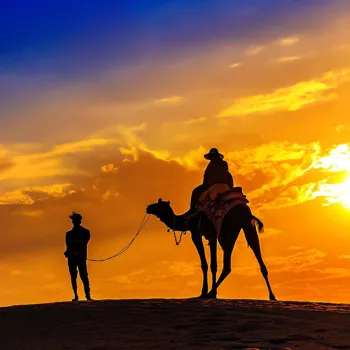Explore 10 Bollywood gems celebrating Indian culture and heritage, offering a peek into the nation's soul
Mumbai: Bollywood, the heart of Indian cinema, has always been a vibrant reflection of our diverse
culture and rich heritage. Over the decades, many movies have not only entertained us but also beautifully showcased the traditions, values, and stories that make India so unique.
These films act as cultural ambassadors, carrying the essence of India to audiences worldwide.
From historical epics to heartwarming family dramas, here's a list of 10 iconic Bollywood movies that wonderfully celebrate Indian culture and heritage, offering a glimpse into the soul of our magnificent nation.
Mughal-e-Azam (1960): A Timeless Tale of Love and Grandeur
K. Asif's "Mughal-e-Azam" is more than just a movie; it's a cinematic marvel. Set in the Mughal era, the film portrays the epic love story of Prince Salim and Anarkali, a court dancer.
The movie magnificently showcases the grandeur of the Mughal empire with its opulent sets, elaborate costumes, and unforgettable music.
It beautifully captures the essence of the era and its nuanced cultural dynamics, giving us a glimpse into the rich artistic and architectural heritage of the time.
Through its dialogues, music, and visual splendor, Mughal-e-Azam immortalizes a significant chapter of Indian history, highlighting the artistic achievements and cultural sophistication of Mughal India.
It remains a benchmark in Indian cinema, inspiring generations with its grandeur and timeless story. The film's enduring appeal lies in its ability to transport viewers to a bygone era, making them feel like they are witnessing history unfold on screen.
Guide (1965): Exploring Spirituality and Self-Discovery
Vijay Anand's "Guide," based on R.K. Narayan's novel, transcends the typical romantic drama. It is a profound exploration of spirituality, self-discovery, and societal expectations. The movie follows Raju, a tourist guide, and Rosie, a dancer trapped in a loveless marriage.

Set against the backdrop of Rajasthan's vibrant landscapes, "Guide" showcases the beauty of Indian traditions and the spiritual quest that is deeply rooted in Indian philosophy. The film subtly weaves in the themes of karma, dharma, and the search for inner peace.
Rosie's journey of self-discovery as she breaks free from societal norms to pursue her passion for dance beautifully symbolizes the progressive spirit of India, blending traditional values with a quest for individual freedom and fulfillment.
The timeless story and the memorable songs continue to resonate with audiences, making "Guide" a cinematic gem that celebrates the spiritual and cultural richness of India.
Anand (1971): Celebrating Life with Optimism
Hrishikesh Mukherjee's "Anand" is a heartwarming story about celebrating life in the face of adversity. The movie revolves around Anand, a terminally ill man who chooses to live each moment with joy and spread happiness around him.
While not explicitly focused on cultural practices, "Anand" embodies the Indian values of resilience, optimism, and the importance of human connection.
The film beautifully illustrates the spirit of selfless service and the power of positive thinking in the face of hardships, which are core principles of Indian philosophy.
"Anand" teaches us valuable lessons about cherishing relationships, finding joy in simple things, and living life to the fullest. The movie is a reminder of the importance of empathy and compassion, reflecting the deep-rooted Indian tradition of community and care.
It is a timeless classic that inspires us to embrace life with gratitude and optimism, reflecting the best aspects of Indian culture.
Chupke Chupke (1975): A Comedy of Errors Rooted in Tradition
Hrishikesh Mukherjee's "Chupke Chupke" is a delightful comedy that embraces Indian family values and lighthearted humor. The film narrates playful pranks centered around a newly married couple and their relatives, showcasing the dynamics of joint families and the importance of familial bonds.
The movie beautifully portrays the warmth and affection shared within an Indian family. The humorous misunderstanding and the witty dialogues showcase the importance of laughter and understanding in maintaining healthy relationships.
"Chupke Chupke" reflects the charm of traditional Indian households, where love, respect, and humor coexist. It's a joyful celebration of the simple pleasures of life and the strength of family ties, making it a timeless comedy that is loved across generations.
The absence of malice and the focus on clean humor makes it a perfect example of wholesome entertainment rooted in Indian values.
Dilwale Dulhania Le Jayenge (1995): Modern Love with Traditional Values
Aditya Chopra's "Dilwale Dulhania Le Jayenge" (DDLJ) redefined romance in Indian cinema, blending modern sensibilities with traditional values. The film follows Raj and Simran, two Indians living in London, who fall in love during a European trip.
While celebrating love, DDLJ also emphasizes the importance of respecting family and upholding cultural traditions. The movie beautifully portrays the challenges faced by the diaspora in balancing their Indian heritage with their adopted Western culture.
Raj's determination to win over Simran's family through genuine affection and respect for their values makes "DDLJ" a celebration of Indian family values.
The film is a timeless romance that continues to resonate with audiences, showcasing the beauty of Indian culture and the significance of maintaining familial bonds even in a globalized world.
DDLJ's success lies in its ability to strike a chord with viewers who appreciate both modern love and traditional values.
Lagaan (2001): A Story of Courage and Unity
Ashutosh Gowariker's "Lagaan" is an inspiring tale of courage, unity, and determination set during the British Raj. The film revolves around a group of villagers who challenge the British to a cricket match to waive off their taxes (lagaan).
"Lagaan" beautifully showcases the power of community, the spirit of resilience, and the importance of standing up for one's rights. The film highlights the rich cultural diversity of India, featuring characters from different backgrounds united by a common cause.
The movie also portrays the traditional rural life of India, showcasing the simplicity and the strong sense of community that is prevalent in villages. Lagaan is a tribute to the indomitable spirit of India and the ability of its people to overcome challenges through unity and perseverance.
The film reminds us of the importance of fighting for justice and the strength that lies in collective action. Lagaan's historical backdrop and its message of unity make it a powerful representation of Indian culture and heritage.
Swades (2004): Rediscovering Roots and Social Responsibility
Ashutosh Gowariker's "Swades" is a poignant story about rediscovering one's roots and embracing social responsibility. The film stars Mohan Bhargav, an NRI scientist working for NASA, who returns to his village in India and is deeply affected by the poverty and lack of basic amenities.
"Swades" beautifully portrays the contrast between urban and rural India and inspires us to contribute to the betterment of our society. The movie beautifully captures the essence of rural life, highlighting the challenges faced by villagers and the importance of education and empowerment.
The film encourages us to reconnect with our roots and use our skills and knowledge to make a positive impact on our communities. "Swades" is a reminder of the importance of social responsibility and the power of individuals to bring about meaningful change.
Its emotional narrative and thought-provoking themes make it a powerful celebration of Indian values and a call to action for a better India.
Jodhaa Akbar (2008): Celebrating Religious Harmony
Ashutosh Gowariker's "Jodhaa Akbar" is a historical epic that celebrates religious harmony and cultural integration. The film portrays the love story of Mughal Emperor Akbar and Rajput Princess Jodhaa, highlighting their journey of understanding and acceptance.
"Jodhaa Akbar" promotes the message of religious tolerance and the importance of respecting different cultures and beliefs. The movie beautifully showcases the rich artistic and architectural heritage of the Mughal era, as well as the valor and traditions of the Rajputs.
The film's emphasis on interfaith dialogue and mutual respect makes it a powerful representation of India's secular ethos. "Jodhaa Akbar" is a celebration of unity in diversity and a reminder of the importance of building bridges between different communities.
Its historical setting and its message of harmony make it a significant contribution to Indian cinema.
Queen (2013): Self-Discovery and Empowerment Against Societal Norms
Vikas Bahl's "Queen" is a heartwarming story of self-discovery and empowerment. Despite not being explicitly folk-based the way one can feel through 'Veer Zara' or 'Parineeta', the storyline is about breaking through the boundaries of marriage and societal expectation of Indian women.
The film follows Rani, a young woman from Delhi who embarks on her honeymoon alone after her fiancé calls off the wedding. "Queen" celebrates the spirit of independence, the resilience of the female spirit, and the importance of self-love.
The movie beautifully portrays Rani's journey of self-discovery as she explores new cultures and overcomes her insecurities. The film is a reminder of the importance of breaking free from societal expectations and pursuing one's dreams.
"Queen" inspires us to embrace our individuality and live life on our own terms, making it a powerful celebration of female empowerment. The film's relatable storyline and its message of self-acceptance have resonated with audiences worldwide.
Bajirao Mastani (2015): A Saga of Love, Valor, and Sacrifice
Sanjay Leela Bhansali's "Bajirao Mastani" is a historical romantic drama that showcases love, valor, and sacrifice. The film narrates the story of Maratha warrior Peshwa Bajirao and his love for Mastani, a warrior princess.
"Bajirao Mastani" highlights the rich Maratha culture, its traditions, and its military prowess. The movie beautifully portrays the grandeur of the Maratha empire and the bravery of its warriors. The film also explores the themes of love, duty, and the sacrifices one makes for their beliefs.
"Bajirao Mastani" is a visual spectacle that celebrates the historical legacy of the Marathas and the enduring power of love, making it a significant contribution to Indian historical cinema.
The film's captivating storyline and its stunning visuals have captivated audiences, solidifying its place as a modern classic.
AI Generated Content. Glance/InMobi shall have no liability for the content











